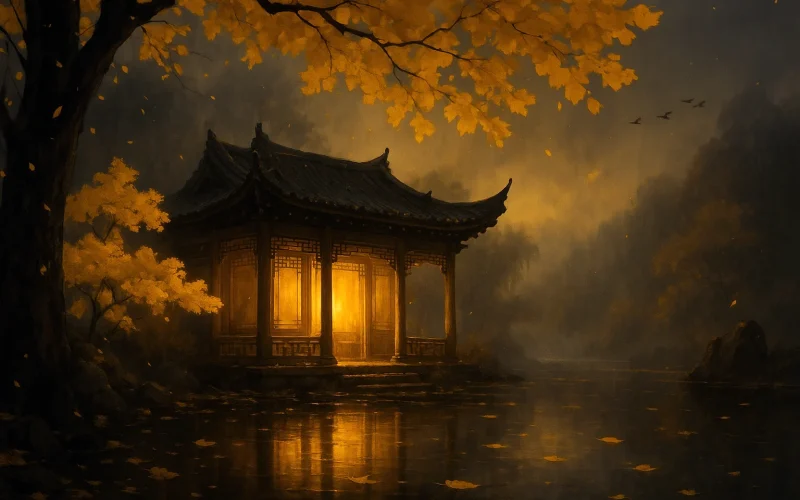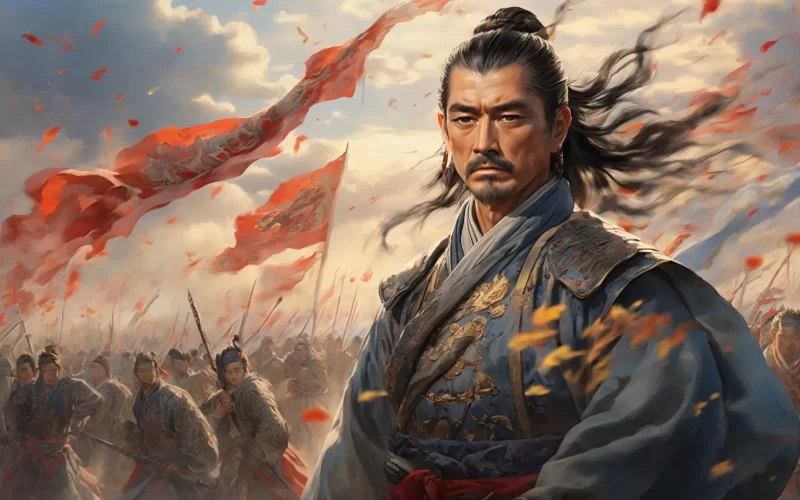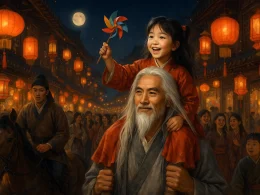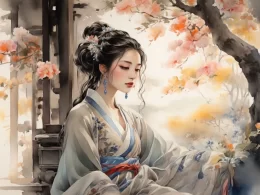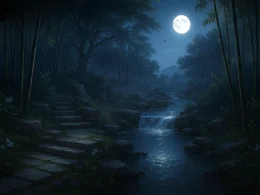After the shower at Bashang,
I see an evening line of wildgeese,
The limp-hanging leaves of a foreign tree,
A lantern's cold gleam, lonely in the night,
An empty garden, white with dew,
The ruined wall of a neighbouring monastery.
...I have taken my ease here long enough.
What am I waiting for, I wonder.
Original Poem
「灞上秋居」
马戴
灞原风雨定,晚见雁行频。
落叶他乡树,寒灯独夜人。
空园白露滴,孤壁野僧邻。
寄卧郊扉久,何年致此身?
Interpretation
Composed in the mid-to-late 9th century during Ma Dai's political disillusionment, this poem was written while the poet resided in a temple near Chang'an's outskirts. "Autumn Dwelling by the Ba River" reflects the quintessential late Tang scholar-official's psyche—talent unrecognized in tumultuous times—using desolate autumn imagery to mirror inner solitude.
First Couplet: "灞原风雨定,晚见雁行频。"
Bà yuán fēng yǔ dìng, wǎn jiàn yàn háng pín.
The storm clears over Ba's plain,
At dusk, wild geese course in endless train.
The opening autumnal twilight—with its clearing storm and urgent southbound geese ("endless train" emphasizing seasonal transition)—sets a restless tone, blending meteorological and emotional calm after turbulence.
Second Couplet: "落叶他乡树,寒灯独夜人。"
Luò yè tā xiāng shù, hán dēng dú yè rén.
Leaves fall on alien trees,
A cold lamp lights my midnight unease.
This couplet crystallizes exile's essence: drifting leaves mirror rootlessness, while the "cold lamp" becomes a metaphysical portrait of isolation. The monosyllabic 寒 (cold) and 独 (alone) strike like temple bells in the poetic void.
Third Couplet: "空园白露滴,孤壁野僧邻。"
Kōng yuán bái lù dī, gū bì yě sēng lín.
White dew drips in deserted garden's keep,
My neighbor—a wild monk beyond the wall asleep.
The auditory precision of dripping dew amplifies existential silence. The "wild monk" neighbor—himself a social outlier—paradoxically intensifies the speaker's solitude through paradoxical companionship.
Fourth Couplet: "寄卧郊扉久,何年致此身?"
Jì wò jiāo fēi jiǔ, hé nián zhì cǐ shēn?
How long must I linger by this gate?
When will my worth find its proper state?
The conclusion's rhetorical question—at once resigned and yearning—encapsulates the Tang intellectual's crisis: suspended between Confucian service and reclusive withdrawal.
Holistic Appreciation
"An Autumn Cottage at Bashang" achieves sublime fusion of scene and sentiment. Ma Dai's autumn is no picturesque tableau but a psychological landscape—geese fleeing storms, leaves abandoning trees, dew marking time's passage—all reflecting a scholar's marginalized existence. The poem's power derives from its restraint: the monk's presence, the dew's sound, and the unanswerable final question accumulate into quiet devastation.
Artistic Merits
The poem's greatest artistic feature is "using scenery to reflect emotion, blending scene and feeling." Ma Dai does not directly voice his disappointment and loneliness but instead meticulously describes imagery such as autumn rain, flying geese, falling leaves, cold lamplight, white dew, and a wild monk to construct a chilly, quiet, and deeply moving atmosphere, conveying profound emotion through subtlety. At the same time, the language is simple and unadorned, yet everywhere reveals deliberate craftsmanship. Phrases like "solitary by cold lamplight," "white dew drips," and "wild monk neighbors" are particularly evocative, rich in imagery and emotional power.
Insights
This poem teaches that profound displacement often speaks in whispers, not shouts. Ma Dai's exile—geopolitical and spiritual—finds voice through dripping dew and distant monks rather than direct lament. For contemporary readers, it suggests that true loneliness isn't absence of people but absence of purpose, and that artistic expression can transfigure even suburban obscurity into timeless meditation. The unanswered final question lingers across centuries: what does one do with an unvalued life? The poem itself becomes one possible answer—to make beauty from neglect.
Poem translator
Kiang Kanghu
About the poet

Ma Dai (马戴) (c. 803–876), courtesy name Yuchen (虞臣), was a native of Quyang (present-day southwest of Donghai, Jiangsu) and a distinguished poet of the mid-Tang period. His poetry is characterized by its refreshing clarity and concise elegance, with particular mastery of five-character regulated verse (五律), embodying a unique aesthetic within Tang literary traditions.






